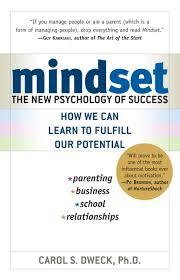What We’re Reading: Mindset, The New Psychology of Success by Carol S. Dweck, Ph.D.
By Carol Hoffman
06-29-2018
How our life journey is vividly influenced by how we choose to think about our own talents and abilities
 While sitting down recently with one of our grantees, they told us about this amazing book, and how they were going to introduce it as a way to frame their work with youth in their afterschool program.
While sitting down recently with one of our grantees, they told us about this amazing book, and how they were going to introduce it as a way to frame their work with youth in their afterschool program.
The book, Mindset by Carol S. Dweck, demonstrates the power of people’s beliefs and how your success at work, school, sports or in any other phase of your life can be vividly influenced by how you think about your own talents and abilities. Dweck calls these two types of mindsets fixed and growth.
First, let’s talk about a person with a fixed mindset. If you have a fixed mindset, you believe you’re either good or not good at what you do or what you want to accomplish in life, because that’s who you are. You believe your basic qualities, like intelligence or talent, are simply fixed traits. This type of mindset is the most common and also the most harmful to a person.
For example, when a fixed mindset student enters high school, their grades tend to decline, and they blame their teachers or other students for their failures in order to protect their own egos. The student with a fixed mindset needs to learn that through failure, you can find success. A person with a fixed mindset hears the saying, “Nothing ventured, nothing gained,” and to them it means, “Nothing ventured, nothing lost.” The same goes for an athlete. You can be a natural born athlete, but if your mindset is not in the right place and you don’t push yourself to be the best that you can be, in the end you fail.
In a fixed mindset, intelligence is stationary and leads to a desire to look smart. But a person with this mindset has a tendency to avoid challenges, and sometimes they just give up all together and never reach their full potential or ability.
Now let’s look at a person with a growth mindset. This person believes they can be good at anything, once they put their mind and actions first and foremost. A person with a growth mindset feels that they learn by their mistakes, that their own failures are only temporary setbacks – and consequently they try harder.
A student with a growth mindset believes anyone can learn, and they tend to lead a more successful life. If they get a grade below what they think it should be, they find out where they went wrong, and they confront the challenge, and keep working toward a better outcome next time. An athlete with a growth mindset who makes a huge mistake in a game doesn’t dwell on it, but instead realizes their mistake, rights their wrong, and uses the experience to be a better player and better person in the future.
In a growth mindset, intelligence grows. This leads to a desire to learn more, embrace challenges, forge ahead after a setback, and then reach a higher level of success.
In the end we all have our own life journey, and it starts by accepting that we all have both mindsets. Our job is to identify what triggers our fixed or our growth mindset. Dweck tells us you do have a choice. Mindsets are powerful beliefs, but you can always change your own mind. Choosing a growth mindset, therefore, is ultimately what Dweck argues will determine your success in life, more than grit or resilience.
I’m looking forward to hearing from our grantee about how this book influences their work with youth in Baltimore City.
